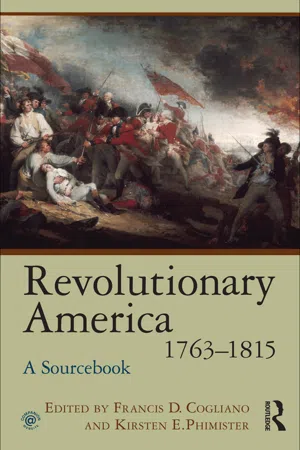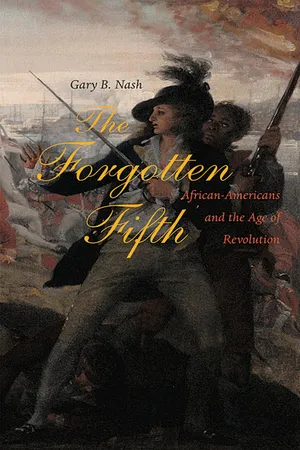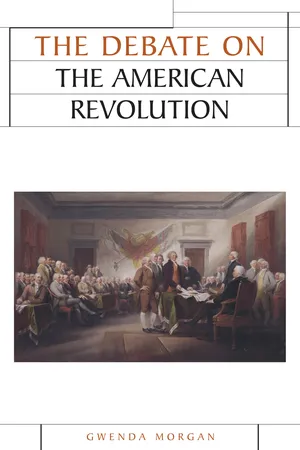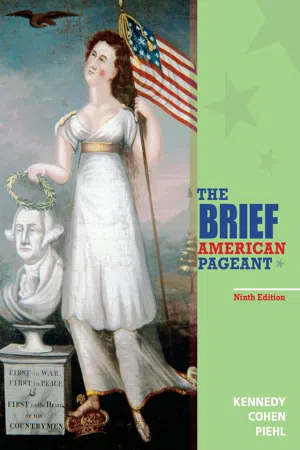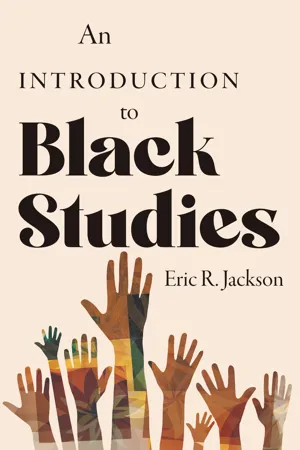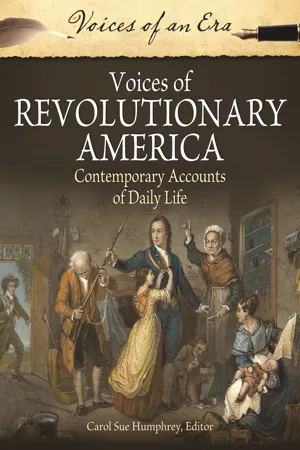History
African Americans in the Revolutionary War
African Americans played a significant role in the Revolutionary War, with both free and enslaved individuals participating on both the British and American sides. Their contributions included serving as soldiers, spies, and laborers. Despite facing discrimination and unequal treatment, their involvement in the war helped to lay the groundwork for the eventual abolition of slavery in the United States.
Written by Perlego with AI-assistance
Related key terms
1 of 5
7 Key excerpts on "African Americans in the Revolutionary War"
- eBook - ePub
Revolutionary America, 1763-1815
A Sourcebook
- Francis D. Cogliano, Kirsten E. Phimister(Authors)
- 2010(Publication Date)
- Routledge(Publisher)
CHAPTER 6 African Americans in the Age of RevolutionIntroduction
“How is it that we hear the loudest yelps for liberty among the drivers of Negroes?” So asked the English lexicographer Samuel Johnson at the height of the imperial crisis. Johnson directly addressed the contradiction at the heart of the American Revolution. When the American revolutionaries committed themselves to independence and republicanism premised on an assertion of equal rights, they did so despite the fact that one-fifth of the American population was enslaved and denied the legal and political rights for which the rebels fought. Some Americans argued that the right to hold human beings as property was among the rights for which they fought, as the November 1775 petition from Patriots in Halifax Virginia suggests (document 1). The Revolution and the War of Independence presented African-American slaves with opportunities to win their liberty. In many cases, particularly in the South, the British presented slaves with the best chance of attaining freedom. Early in the war Lord Dunmore, the last royal governor of Virginia, offered freedom to the slaves of rebels who fled their masters, like those in Halifax County, and supported the British war effort (document 2). This set a precedent which the British oft en followed during the war; many slaves associated the British with freedom.A Virginian, Thomas Jefferson, perhaps more than any other American, epitomized the contradiction criticized by Samuel Johnson. Documents 3a–d reflect the range of Jefferson’s thinking on the subject. Included are his condemnation of the slave trade in his draft of the Declaration of Independence, his notorious theories on racial differences as well as his analysis of the impact of slavery on whites from Notes on the State of Virginia - eBook - PDF
The Forgotten Fifth
African Americans in the Age of Revolution
- Gary B. Nash, Gary B Nash(Authors)
- 2009(Publication Date)
- Harvard University Press(Publisher)
vant who joined the British with a willingness to fight against the treasonous Americans. The cat was now out of the bag: massive defection from slavery among a people pictured by white historians as docile and contented. African Americans, wrote Aptheker, “played what at first glance appears to have been a dual role from 1775 to 1783”—service with American forces “when they were permitted to do so” and wholesale flight to the British in search of freedom. These “varied and superficially contradic-tory activities” had “one common origin, one set pur-pose—the achievement of liberty.” As in every epoch of African American history, he reasoned, “the de-sire for freedom is the central theme, the motivating force.” 6 In 1961 Benjamin Quarles employed Aptheker’s new conceptual framework to produce his classic The Negro in the American Revolution. In the book’s preface, Quarles stated: “The Negro’s role in the Revolution can best be understood by realizing that his major loyalty was not to a place nor to a people but to a principle. Insofar as he had freedom of choice, he was likely to join the side that made him the quickest and best offer in terms of those ‘unalienable rights’ of which Mr. Jefferson had spoken.” A sprawling schol-arship since 1961, detailed in scores of entries that 6 T H E F O RG O T T E N F I F T H tumble off the pages of The Harvard Guide to African-American History (2001), proceeds from Quarles’s re-markable achievement. In this chapter I explore the varieties of black revolutionary experience, with vignettes of individual men and women who can stand for large numbers of others. In the whole, it is a story of an extraordi-nary willingness—some would call it recklessness—to seize the moment to secure what was prized above all else: freedom. - eBook - PDF
- Gwenda Morgan(Author)
- 2024(Publication Date)
- Manchester University Press(Publisher)
The role of the African American in the Revolution, Quarles argued, was best understood by recognizing that black loyalty ‘was not to a place nor to a people, but to a principle’. Given a choice, ‘the African American was likely to join the side that made him the quickest and best offer’. African Americans were infused with the spirit of ’76. ‘Whoever invoked the image of liberty, be he American or British, could count on a ready response from the blacks.’ How slaves and free blacks engaged with the conflict and with what consequences form the principal themes of Quarles’s study. 56 The recruitment of blacks to the Patriot cause was dictated by manpower needs, which though not desperate in the first two years of the war, became acute in the third. 57 Black military service was most extensive in New England where it was pioneered in the towns and subsequently adopted by THE DEBATE ON THE AMERICAN REVOLUTION 190 state governments who reversed earlier policies. ‘Negro soldiers served in the minutemen companies of Massachusetts in the early weeks of the war, in the state militias of the Northern states, and in the state and Continental forces.’ Unlike Maryland, Virginia declined to enlist slaves though it lifted a ban on free blacks. South Carolina and Georgia remained adamant in opposing slave enlistment despite Congressional prompting, the British occupa- tion of Savannah and the opening of a second campaign in the south. ‘The Negro in South Carolina and Georgia who sought to bear arms in the American cause,’ wrote Quarles, ‘may have felt that the war was being waged for white freedom and black slavery’, a subject to which Sylvia Frey and Robert Olwell would return many years later. 58 Service on the American side was extensive but unrecognised, as ‘anonymous labour’: Negroes erected fortifications, manufactured cannon and gun carriages, worked in the salt and lead mines, repaired roads, and drove wagons. - eBook - PDF
The Brief American Pageant
A History of the Republic
- David Kennedy, Lizabeth Cohen, Mel Piehl, , David Kennedy, Lizabeth Cohen, Mel Piehl(Authors)
- 2015(Publication Date)
- Cengage Learning EMEA(Publisher)
Editorial review has deemed that any suppressed content does not materially affect the overall learning experience. Cengage Learning reserves the right to remove additional content at any time if subsequent rights restrictions require it. The Road to Revolution 99 the northern states, had enlisted in the American armed forces. Blacks fought at Trenton, Brandywine, Saratoga, and other important battles. African Americans also served on the British side. In November 1775 Lord Dunmore, royal governor of Virginia, issued a proclamation offering freedom to any enslaved black in Virginia who joined the British army. In time, thousands of blacks fled plantations in response to British promises of emancipation. At war’s end the British kept their word, to some at least, evacuating as many as four-teen thousand “Black Loyalists” to Nova Scotia, Jamaica, and Britain. Morale in the Revolutionary army was badly under-mined by American profiteers. Putting profits before patrio-tism, these speculators sold supplies to the British and made profits of 50–200 percent on army garb while the American army was freezing at Valley Forge. The failures of revolu-tionary zeal meant that Washington never had as many as twenty thousand effective troops in one place at one time. The brutal truth is that only a select minority of colo-nists attached themselves to the cause of independence with a spirit of selfless devotion. These were the dedicated souls who bore the burden of battle and the risks of defeat. Seldom have so few done so much for so many. Enslaved blacks hoped that the Revolutionary crisis would make it possible for them to secure their own liberty. - eBook - ePub
- Eric R. Jackson(Author)
- 2023(Publication Date)
- The University Press of Kentucky(Publisher)
African Americans who resided in the colonies—most of them in bondage—followed the events of the 1750s, 1760s, and 1770s closely. Each step toward revolution brought greater attention to the question of what rights and responsibilities Britain had with regard to its American colonies. Whether it had the political authority to tax the colonists, whether royal governors had the power to disband colonial legislatures—these things admittedly mattered very little to most African Americans. What did capture their attention, however, was the language the colonists used and their methods of resistance, which they took as models to emulate in their attempt to obtain their own liberty. The simplest form this resistance took was running away, a means by which hundreds of African Americans escaped slavery in South Carolina and the Georgia low country. But some protested. In January 1766, for example, a group of enslaved African Americans marched through the streets of Charleston, South Carolina, shouting: “Liberty, Liberty, Liberty!” And some even made a formal case for freedom. As early as 1701, an enslaved person from Massachusetts had gone to court and won his suit for freedom. As revolution approached, more and more African Americans began to use the arguments of White revolutionaries such as Thomas Paine and Thomas Jefferson to fortify their calls for freedom. In fact, a 1777 slave petition to the Massachusetts general assembly proclaimed: “Your Petitioners . . . have in Common with all other men a Natural and Unaliable Right to that freedom which the Grat Parent of the Unavers hath Bestowed equalley on all menkind” (Prince Hall, p. 2).When the Revolutionary War began, African Americans were essentially opportunistic when it came to choosing between the English and the Americans, supporting whichever side they saw as most likely to offer them their freedom. Interestingly, despite having fought beside the rebels in several early skirmishes, they were forbidden to enlist in the military, whether free or enslaved, when General George Washington organized the Continental Army in July 1775. Soon, all thirteen colonies had followed Washington’s example, banning them from joining state militias. Of course, the British used the opportunity to recruit Blacks, the most famous appeal being the proclamation issued by the royal governor of Virginia in November 1775 offering freedom to enslaved persons who fought for British or Loyalist units. (Some one thousand African Americans joined the British in response.) In December 1775, Washington reversed his decision, and, owing to troop shortages, several state governments followed suit by the end of the next year. However, a few southern states (including North and South Carolina and Georgia) held firm to the ban despite the fact that hundreds of southern Blacks served in military units in other states. Overall, of the roughly 300,000 men who fought on the colonists’ side, about 5,000 were Black. - eBook - PDF
Voices of Revolutionary America
Contemporary Accounts of Daily Life
- Carol Sue Humphrey(Author)
- 2011(Publication Date)
- Greenwood(Publisher)
Approximately one thousand slaves ran away and joined Dunmore in the aftermath of his proclamation. Slaves in other parts of America also ran away and joined the British as well, hoping that freedom would be the result of their service. Many of those who survived the war went into exile along with white Loyalists who chose not to remain in the United States fol- lowing the end of the war. Voices of Revolutionary America 212 Military service proved to be a ticket to freedom for slaves during the American Revolution. Investigate other wars in American history prior to the adoption of the 13th Amendment to see if that was true at other times as well. Further Reading Berlin, Ira, and Ronald Hoffman. Slavery and Freedom in the Age of the American Revolution. Charlottesville: University of Virginia Press, 1983. Davis, David Brion. The Problem of Slavery in the Age of Revolution. Ithaca, NY: Cornell Uni- versity Press, 1975. Kaplan, Sidney, and Emma Nogrady Kaplan. The Black Presence in the Era of the American Revolution. Rev. ed. Amherst: University of Massachusetts Press, 1989. MacLeod, Duncan J. Slavery, Race, and the American Revolution. Cambridge: Cambridge University Press, 1975. McDonald, Forrest. Alexander Hamilton: A Biography. New York: W. W. Norton, 1979. Morgan, Edmund S. American Slavery, American Freedom. New York: Oxford University Press, 1975. Nash, Gary B. Freedom and Revolution. Madison: University of Wisconsin Press, 1991. Quarles, Benjamin. The Negro in the American Revolution. Chapel Hill: University of North Carolina Press, 1961. Randall, Willard Sterne. Alexander Hamilton: A Life. New York: Harper Collins, 2003. Film and Television Alexander Hamilton, PBS, 2007. 213 40. GROWING QUESTIONS ABOUT S LAVERY: ESSAY BY CAESAR SARTER (1774) INTRODUCTION European settlers in the New World had enslaved Africans since the 16th century, and American colonists, particularly in the southern colonies, had engaged in the practice as a way to gain cheap labor. - eBook - PDF
The Book of Negroes
African Americans in Exile after the American Revolution
- Graham Russell Gao Hodges, Alan Edward Brown, Graham Russell Gao Hodges, Alan Edward Brown(Authors)
- 2021(Publication Date)
- Fordham University Press(Publisher)
In smaller states such as Rhode Island and Connecticut, blacks made up significant portions of the regiments. 9 As Patriots hesitated or refused to include blacks in the battle for freedom, African Americans sided with the British. Americans recognized black preferences for the English. Henry M. Muhlenberg realized early in the war that the Negroes secretly wished the British army might win, for then all Negro slaves will gain their freedom. It is said that this sentiment is universal amongst all the Negroes in America. In early 1776, patriot Charles Lee sought to impose military order over the black population of Virginia, noting dominion over the black is based upon opinion, [without] that, authority will fal1.10 During the Revolution, British army movements attracted tens of thousand of blacks seeking freedom. English policies intended to disrupt the American economy by luring black laborers. Promises of freedom were the best enticements the British could offer, and African Americans of all ages flocked inside the invading army lines. The British organized black regiments as well as free-lance guerrilla units, known as followers of the flag. They used others as xiv / the book of negroes pilots, spies, and waggoneers. In succeeding years, black soldiers, spies and laborers provided important substance to the British military effort around New York City . 11 As British forces marched back and forth through New York, New Jersey, Pennsylvania, Maryland, Virginia, the Carolinas and Georgia, they attracted women as well as men. In the war, black females worked as servants, cooks, and laundresses. Estimates of 25,000 to 55,000 fugitives in the southern states alone added up to the largest black escape in the history of North American slavery. Nothing comparable had ever occurred before or would not again until the Emancipation Proclamation in 1863. 12 New York City was the securest destination for Loyalists of both races.
Index pages curate the most relevant extracts from our library of academic textbooks. They’ve been created using an in-house natural language model (NLM), each adding context and meaning to key research topics.
